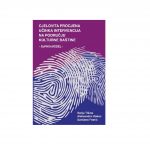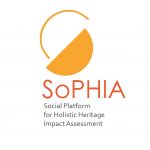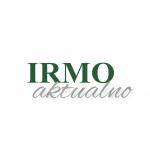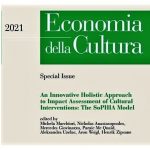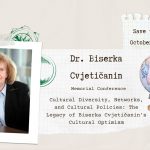On April 21 and 22, 2021, the European Union research and innovation project Social Platform for Holistic Heritage Impact Assessment – SoPHIA will host the Virtual Stakeholders Conference: Cultural Heritage – Rethinking Impact Assessments, that will gather European researchers, practitioners and policymakers to discuss the assessment of the impacts generated by interventions in cultural heritage.
The way cultural heritage is preserved and enhanced is a major factor defining Europe´s identity and its place in the world. The European Union has further strengthened its importance through policy provisions, such as the European Landscape Convention (2000) and the Faro Convention (2005), the European Year of Cultural Heritage (2018) or the European Framework for Action on Cultural Heritage (2019) as well as through funding programmes such as Horizon 2020 (Horizon Europe as of 2021), Interreg Europe and Creative Europe, among others.
In this framework, SoPHIA seeks to contribute to EU policies through targeted recommendations to set quality requirements and shared standards for impact evaluations but also to gear future funds deployed for cultural heritage interventions. Indeed, when such interventions produce positive impacts, they spur sustainable growth and foster social cohesion as well as a sense of well-being by local communities; whereas, when they produce negative impacts, they not only generate unfavourable perceptions from both experts and citizens but also damage irreplaceable historical elements, their environment as well as related intangible heritage, identities and social practices.
As part of the SoPHIA project, partners of the consortium are currently designing a holistic heritage impact assessment model that covers all dimensions of sustainable development, namely the social, economic, cultural and environmental. The model has been tested in twelve European case studies, including a landscape, two museums, two programmes, three cultural districts, a place of remembrance, a historic city centre, an island and a monastery. This has enabled for the identification of a range of cross-cutting issues that will serve as a basis for discussion at the Conference: green economy and cultural heritage; impacts for social capital and knowledge; dissonant cultural heritage narratives for identity building and belonging; quality of life and tourism. Also, the European Capitals of Culture (ECoC) will serve as an example to address essential elements for impact assessment that are often disregarded: the time factor and the active involvement of diverse stakeholders, including citizens.
Conference speakers include highly renowned experts from the academia and civil society as well as policymakers: Erminia Schiacchitano, Cabinet of the Italian Minister of Cultural Heritage, Pier Luigi Sacco, Professor of Cultural Economics at the University of Milan and Head of the OECD Venice Office, or Hanna Lämsä, Director of the Association of Cultural Heritage Education in Finland, among others. The session dedicated to the ECoCs will feature Matera 2019 in Italy, Galway 2020 in Ireland, Novi Sad 2021 in Serbia and Eleusis 2023 in Greece. It will be moderated by Beatriz García, University of Liverpool, who led the “Impacts 08“ initiative to inform city strategists on culture-led urban regeneration through mega events. Representatives from the twelve SoPHIA case studies will also contribute to the sessions.
On April 21, from 9:30 to 17:00 CET, parallel panel discussions will broach the cross-cutting issues described above, and will be complemented with networking spaces, artistic interventions and virtual guided tours of the MuseumsQuartier Wien and the Jewish Cemetery Währing, in Vienna, Austria. The second day, on April 22, from 10:00 to 13:00 CET, parallel sessions will serve to discuss the SoPHIA draft impact assessment model for cultural heritage interventions.
The Conference is open and free of charge.
The Stakeholders Virtual Conference: Cultural Heritage – Rethinking Impact Assessments is hosted by EDUCULT, Austria. The SoPHIA project is led by Roma Tre University, Italy, in partnership with EDUCULT; Interarts, Spain; the European Museum Academy (EMA), The Netherlands; the National Technical University of Athens (NTUA), Greece; the Institute of Art Design and Technology (IADT), Ireland; and the Institute for Development and International Relations (IRMO), Croatia. It is funded by the European Union Horizon 2020 Research and Innovation Programme under Grant Agreement No 870954.


